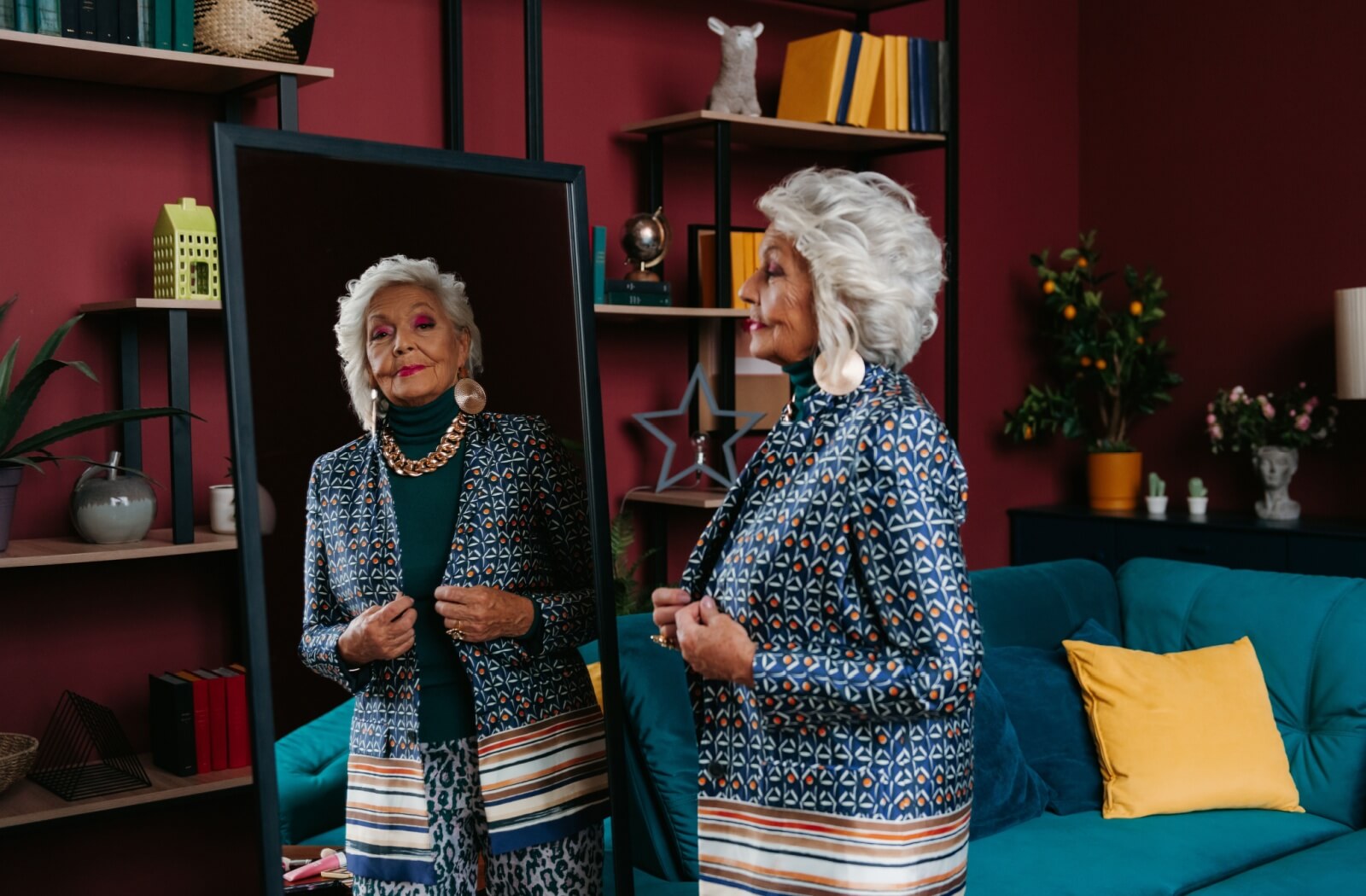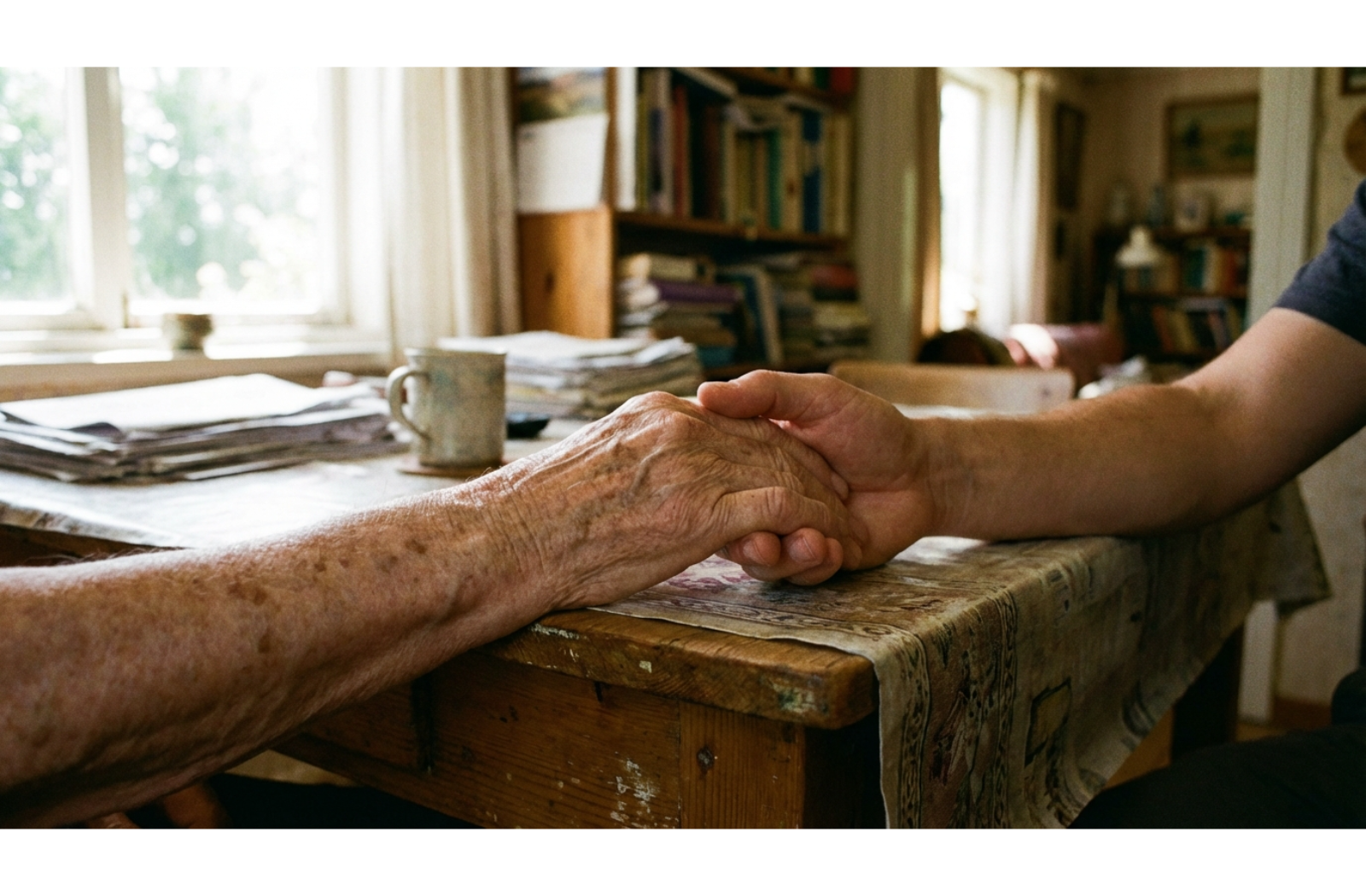Clothing for Dementia Patients
- Posted on
- By Mira Vie Senior Living

Dressing is a routine task that most people can do without a second thought. However, for seniors with dementia or Alzheimer’s disease, getting dressed can often present daily challenges. Difficulty with buttons, zippers, and coordination can make the experience frustrating for both the individual and their caregiver.
Fortunately, there are clothing alternatives that don’t sacrifice personality or fashion. In particular, adaptive clothing—or clothes with modifications like Velcro or magnetic closings to simplify dressing—comes in many sizes, colors, and patterns that are pleasing to many personalities.
How Does Alzheimer’s Affect Dressing?
Alzheimer’s and dementia progressively affect cognition, memory, and mobility—with dressing being no exception. Several factors often make this essential task more difficult for those living with dementia, such as:
- Cognitive decline, which may cause confusion about the order and purpose of clothing items, such as attempting to put pants on as a shirt.
- Memory loss, which can lead to forgetting how buttons, zippers, or laces function.
- Dexterity challenges, which may make fastenings and tiny details hard to grip.
- Sensory sensitivities, such as irritation due to textures, tags, or tight clothing, can cause distress.
For caregivers, these challenges mean that selecting the right clothing is more than just a fashion choice—it’s a form of care that can directly improve a loved one’s quality of life.
How to Choose Clothing for People with Dementia
Clothing for someone living with dementia should prioritize ease, comfort, and dignity. Here are some key tips to consider when selecting outfits:
- Prioritize Ease of Use. Opt for clothes with elastic waistbands, Velcro closures, or magnetic buttons to simplify self-dressing or assistive dressing.
- Choose Soft and Comfortable Fabrics. Avoid rough textures, tight fits, or constricting materials that may agitate sensitive skin or nerves.
- Keep Natural Movements in Mind. Clothes that are too fitted or intricate can restrict mobility. Loose-fitting, stretchy garments are typically more convenient.
- Select Easy-to-Maintain Items. Caregivers often juggle numerous responsibilities, so machine-washable, durable clothing can make life much easier.
- Maintain Dignity and Individuality. A person’s sense of self-worth can be tied to their clothing. Choose pieces that reflect your loved one’s personality and preserve their dignity.
Key Features to Look For
Not all clothing is created equal, particularly when it comes to dementia-friendly wardrobes. Seek out these key features to ensure that clothing fits the needs of your loved one:
- Adaptive Fasteners. For easy opening and closing, look for Velcro, snaps, zippers, or magnets instead of traditional buttons.
- Tag-Free Designs. Clothing without scratchy tags or internal seams helps prevent unnecessary irritation for individuals with sensory issues.
- Open-Back Designs. Adaptive clothing with open-back designs simplifies dressing for those who struggle with mobility.
- Elastic Waistbands. These allow pants or skirts to slide on quickly without the hassle of zippers or buttons.
- One-Piece Garments. Jumpsuits or dresses minimize the need to coordinate multiple items.
Best Dementia Clothing for Your Aging Loved One
These clothing recommendations, tailored for people with Alzheimer’s and dementia, will make shopping decisions less stressful.
Soft-Waist Pants
Soft-waist pants with elastic bands are a must-have for everyday wear. These pants eliminate fumbling with zippers or belts and provide comfort, especially for extended day-to-day use. Look for options in breathable materials like cotton or jersey.
Dresses
Simple pullover dresses are an elegant and functional choice, as they eliminate unnecessary fastenings while still offering a dignified look. Some dresses have magnetic snap closures for added functionality.
Jumpsuits
Jumpsuits are particularly helpful if disrobing has become a safety concern. Designed to stay secure, jumpsuits prevent accidental undressing and ensure comfort.
Adaptive Shirts & Sweaters
Adaptive tops with magnetic closures or wide necklines make dressing the upper body easy. They look like traditional clothing but come with extra functionality designed for accessibility.
How Does Adaptive Clothing Work?
Adaptive clothing is specifically designed for people who have difficulty dressing due to physical or cognitive challenges. Unlike traditional clothes, adaptive garments feature modifications that simplify the dressing process while maintaining the appearance of regular clothing.
Typical design elements include open-back shirts, Velcro fastenings, or magnetic closures instead of standard buttons, snaps, or ties. These thoughtful adjustments make dressing faster and less frustrating for caregivers while prioritizing the comfort and dignity of the wearer.
How Can Adaptive Alzheimer’s Clothing Help People with Dementia?
Simplifying the act of dressing not only saves time for caregivers but also offers an enhanced sense of independence for those with dementia by:
- Reducing Frustration. Easy-to-use features prevent dressing-related meltdowns, fostering positive interactions between caregivers and seniors.
- Restoring Dignity. Clothing tailored for accessibility doesn’t have to look “clinical”—it can reflect a person’s unique style while meeting their physical needs.
- Promoting Safety. Garments like anti-strip jumpsuits prevent unsafe or inappropriate disrobing, especially in public environments.

How Memory Care Makes Getting Dressed Easy
If caring for a loved one with dementia becomes overwhelming, memory care communities can provide a professional and supportive environment to simplify their daily routines, including dressing. Staff are trained to assist with personal hygiene and dressing using patience and respect for the individual’s preferences.
Meanwhile, family members can look into providing adaptive clothing to staff to ensure that their loved one always has comfortable, practical options readily available.
Your Loved One Deserves Clothes that Care
Clothing is an important part of a person’s comfort, dignity, and independence. You can eliminate unnecessary frustration and foster positive emotional well-being by selecting adaptive clothing thoughtfully designed for their needs.
Mira Vie Senior Living understands that transforming a daily challenge into a stress-free routine is a meaningful form of support for people living with dementia. Contact us today to see how our memory care communities can support your loved one.
Related Articles

Understanding Various Types of Assisted Living Contracts
Key Takeaways Senior living communities offer several contract types, including those with large entrance payments